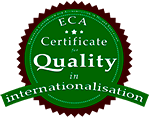Certificate for Quality in Internationalisation
UPF's Faculty of Economic and Business Sciences has been awarded the certificat CeQuInt becoming the first and only faculty in Spain to obtain this recognition, awarded by fourteen European accreditation agencies, in recognition of the incorporation of an international dimension to higher education.
Recognition for the work of the oldest faculty (along with that of Law) and with the highest number of students of UPF, the Economic And Business Sciences Faculty, as the first in Spain to be awarded a certificate accrediting the quality of the internationalization process issued by a consortium of fourteen European accreditation bodies, began on 29 November, 1989, when the president of the Generalitat (Catalan Government), the Minister of Education and lecturers Enric Argullol and Andreu Mas-Colell agreed to create Catalonia's then fourth public university.
Throughout these years, the Faculty of Economic and Business Sciences at UPF has been the spearhead of the policies of modernization and internationalization of the university system of Catalonia based on recruiting, without showing favouritism, lecturers from more than twenty countries around the world, teaching 67% of classes in English, taking the Bologna process seriously, receiving 350 foreign students each year from 70 countries, and sending 300 of its own on exchange programmes, and finally plugging internships reaching the figure of 817 during the last academic year 2013-2014 (with a thousand expected for this academic year 2014-15).
Almost everything hinges around mobility. Lecturers, technical officers and managers with mobility must be recruited. In this way, the UPF Economics and Business Group has managed to come in first position in Spain, tenth in Europe (QS ranking and Tilburg ranking) and fortieth in the world (QS ranking). News has recently been received that the European Research Councilhas awarded two grants to two Economics and Busines lecturers, which makes this group (which includes the CREI and the IPEG) the European institution, for any discipline, to receive the highest number of ERC grants; this is also significant from the point of view of survival since a highly stressed faculty lacking budget has deployed high quality training.
And the contribution of Secretariat has been decisive in this regard, given that it has had to develop intercultural and language skills in order to deal not only with students coming over from a great many countries and those going abroad on exchanges, but also the complexity involved in innovating in bureaucratic contexts.
At this point, we underwent the accreditation procedure, with the self-evaluation report carried out once the Faculty presented itself voluntarily for the process. On 12 and 13 May, 2014, an international committee, chaired by professor Rainer Kützel visited us and held interviews separately with students, teaching staff and persons holding academic positions and those responsible for international mobility as well as with the employers of the students of the Faculty from their Advisory Board. In all, the process involved a total of 250 hours' work: 100 by the Faculty (notably professors Àngel Gil, Exchange coordinator, and Carmen Pérez, an expert in English-Medium Instruction), and 150 hours in by UPF central services. We should also mention the work done by Pau Fernández, along with Macarena López, of the CQUID; Monica Pellisé, Lucía Conte and Meritxell Cama of the Mobility and Reception Office; Jordi Serret, of the UEPA, and the Career Services.
We close with a reference to mobility, not always wanted, with a few verses by Rosalía de Castro from a presentation by Anxo Sánchez reflecting on science in Spain:
Ánimo, compañeiros!
Toda a terra é dos homes.
Aquel que non veu nunca máis que a propria,
a iñorancia o consome.
¡Ánimo! ¡A quen se muda Dios o axuda!
"Courage, fellows!/ All of the land is of men./ He who has seen but his own,/ is consumed by ignorance./ Courage! God helps he who changes!"

